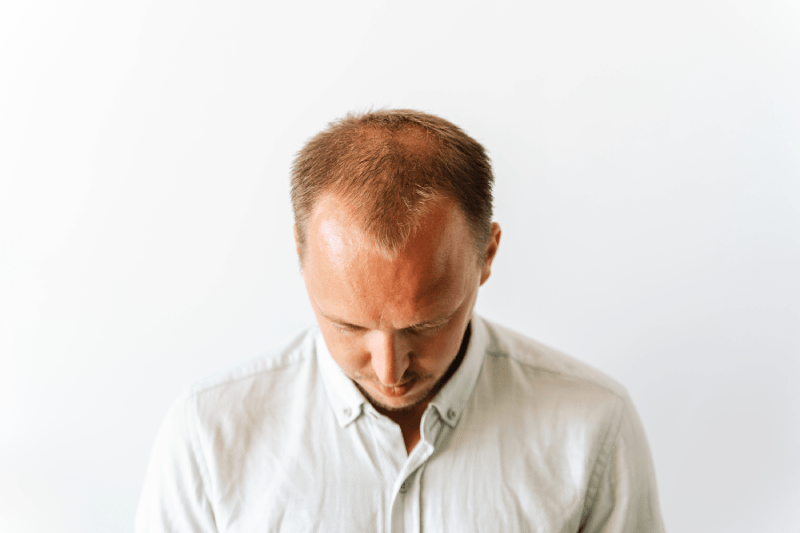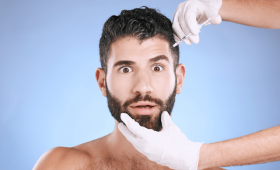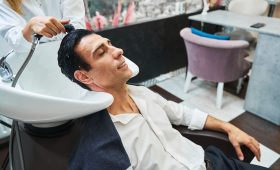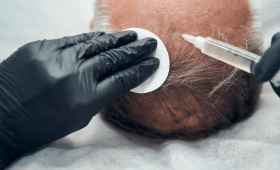Hair loss is a complex process often resulting from a combination of genetic predisposition, hormonal changes, or lifestyle factors. A large majority of men, especially as they age, have to contend with androgenetic alopecia (male pattern baldness). In women, the causes of hair loss are more varied, potentially stemming from iron deficiency, thyroid issues, or conditions like menopause.
Accurately understanding the cause of hair loss is the first and most critical step before beginning treatment. While many tend to accept the condition rather than seeking solutions early on, modern medicine and particularly hair transplantation technologies offer permanent and aesthetic remedies. Since this condition directly impacts personal self-confidence and social life, the desire to find a solution is completely natural.
What is Male Pattern Baldness and How Does It Progress?
Male pattern baldness occurs when a hormone called dihydrotestosterone (DHT) gradually shrinks (miniaturizes) the hair follicles over time. This process typically begins with a receding hairline at the temples and thinning at the crown. A classification system known as the Norwood Scale is used to determine the stages of baldness and forms the basis of hair transplant planning.
As baldness progresses, only the DHT-resistant hairs on the back and sides of the head (the donor area) remain. These resistant follicles are the valuable resource used in hair transplant operations. This type of baldness can start in early adulthood or become noticeable after the age of 30. Baldness is not merely an aesthetic concern but also a progressive biological condition.
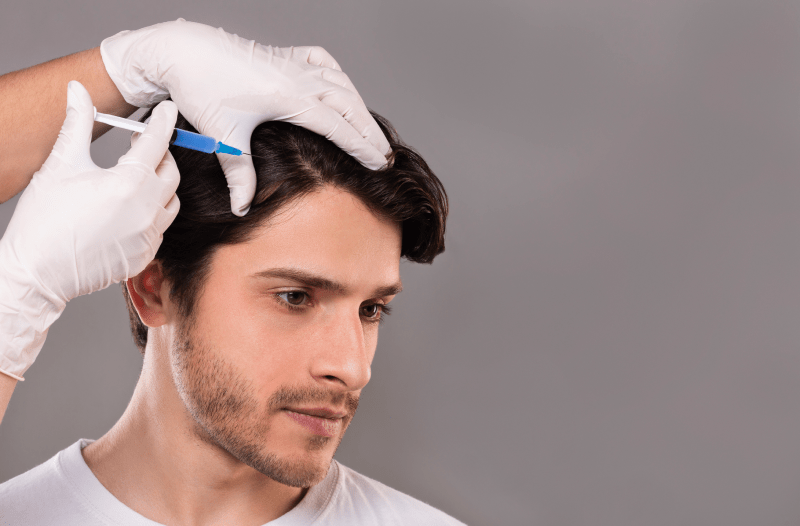
Hair Loss in Women: Different Approaches
Hair loss in women generally does not create a distinct bald line like in men; it appears more as a general thinning or sparsity of the hair. This condition is commonly referred to as “diffuse hair loss.” The relationship between hair loss and hormonal imbalances, the postpartum period, stress, or poor nutrition is stronger in women.
Although hair transplantation yields successful results in women, an investigation into the underlying medical causes is usually required first. In women, preserving the donor area and placing the grafts at the correct angle involve aesthetic details that are more critical than in men. Clinics in Turkey have extensive experience, particularly in transplant techniques that deliver sensitive and natural results for women.
The Role of Genetic Factors
Genetics is often the primary culprit behind hair loss. If you have a family history of baldness, the probability of it occurring in you is quite high. Genetic predisposition determines how sensitive your hair follicles are to the DHT hormone. If you decide to undergo a hair transplant, the procedure operates on the principle of extracting these genetically resistant hair follicles from the donor area and transferring them to the thinning areas. For this reason, the transplanted hairs tend to be permanent throughout life, as their genetic code is maintained even in their new location. Anyone considering treatment should analyze their family history in detail from this perspective.
The Effect of Stress and Nutrition on Hair Health
Hair health is a reflection of the body’s overall health. Intense stress can trigger temporary hair shedding known as Telogen Effluvium, causing hairs to prematurely enter the resting phase. Similarly, a diet lacking essential nutrients such as iron, zinc, B12, and protein weakens hair roots and leads to thinning. Hair transplantation permanently fills in bald patches, but lifestyle adjustments and proper nutrition are critical for maintaining the health of existing hair. Professional hair transplant centers provide detailed guidance on these matters post-treatment.
When Should You Seek Medical Help?
It can be difficult to decide when hair loss reaches a concerning level. While losing 50 to 100 hairs a day is considered normal, continuous loss above this number, noticeable recession of the hairline, or rapid thinning at the crown may necessitate medical intervention. Early diagnosis can slow the progression of the condition with medical treatments (such as PRP, mesotherapy, or medication). However, when irreversible hair loss and permanent bald areas occur, the only lasting solution is hair transplantation. At this decision stage, seeking a free consultation from a reliable center is the best starting point.
What is Hair Transplantation Essentially?
Hair transplantation is the process of taking healthy hair roots (grafts) from the back and sides of the head (the donor area), which are genetically resistant to shedding, and transferring them to the recipient area experiencing baldness or thinning. Although this procedure is surgical, it is performed under local anesthesia and is usually completed as a day-case operation. The success of a hair transplant depends not only on the number of roots transplanted but also on setting the implantation direction, angle, and density to support a natural look. These details require the precision of a work of art and should be performed by an experienced team.
How Does the FUE Technique Work?
Follicular Unit Extraction (FUE) is the most common and least invasive hair transplantation technique used today. In this method, special designed micro motor punches or manual punches are used to extract hair roots one by one from the donor area. As a result, no large incisions or suture scars are left in the donor area, only millimetric holes that heal quickly. The collected grafts are then placed into channels opened in the recipient area. FUE is ideal for large area transplantation and allows for rapid patient recovery, making it a popular choice among international patients.
DHI Technique: The Difference of the Pen Method
Direct Hair Implantation (DHI) is an innovative technique performed using a special pen (implanter) called the Choi pen. The key difference from FUE is that the channel opening and graft placement processes are done in a single step. This minimizes the time the roots wait outside and theoretically increases the survival rate of the follicle. DHI is preferred, especially when transplanting between existing hairs (non-shaven or density enhancement), as it reduces damage to the existing hair. It offers high precision for those seeking high density and a natural appearance.
The Distinction Between Sapphire FUE and Classic FUE
Sapphire FUE is an evolution of the classic FUE technique. Instead of steel-bladed scalpels, special sharp tips made of sapphire stone are used to open the channels where the grafts will be placed. Sapphire tips allow for the creation of much finer, smoother, and more precise channels. This reduces tissue trauma, speeds up the healing process, and helps achieve a more natural, three-dimensional result, especially when high-density transplantation is desired. Sapphire FUE has become the standard choice for modern clinics in Turkey, which is an indicator of the quality provided.
Who is Eligible for Hair Transplantation?
Hair transplantation is generally suitable for anyone over the age of 18 who is experiencing permanent hair loss and has a sufficient number of healthy hair roots in the back of the head (the donor area). Patients with chronic diseases such as diabetes or heart disease must first obtain doctor approval. The best results are achieved in patients whose level of baldness has stabilized and whose donor area density is high. Being a healthy candidate directly affects not only the success of the operation but also the comfort of the recovery process.
Donor Area Selection and Its Importance
The donor area is the key to hair transplantation. This area is where the hair roots with the genetic code resistant to the DHT hormone, which causes hair loss, are located. Typically, the back of the head and above the ears are used. A successful transplant begins with the correct management of the donor area. Over-harvesting can lead to thinning of the donor area and a poor aesthetic look. Experienced teams in Turkey take great care to maximize yield from the donor area while preserving its aesthetic integrity.
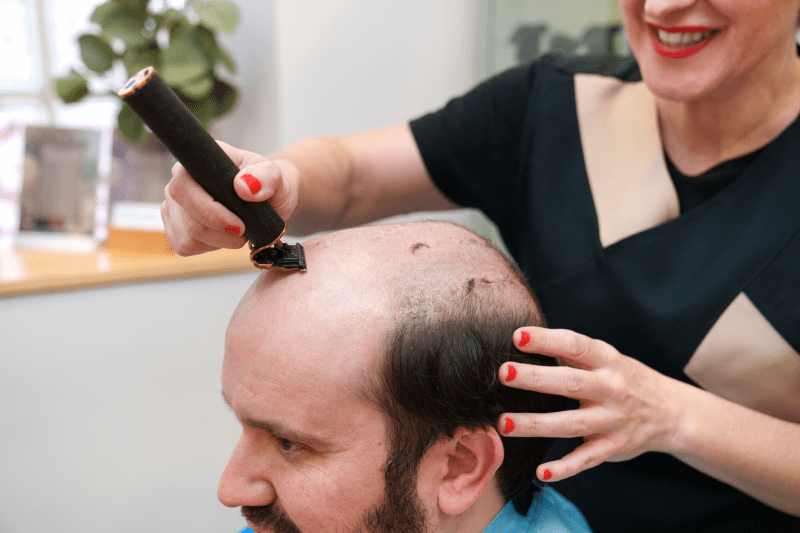
A Successful Hair Transplantation Process
A successful hair transplant is not just about surgical skill; it is a holistic process that includes detailed pre-planning, correct graft extraction, appropriate channel opening, and placing the roots in a natural direction. Success begins with the design of the natural hairline; this line must be suitable for the patient’s facial structure and age. Hygiene, sterilization, and the use of specialized equipment are of great importance at every stage of the operation.
The Recovery Period After Hair Transplantation
The recovery period is a critical stage that directly influences the success of the transplant. Swelling and redness are normal for the first few days. Scabbing and itching may be seen during the first two weeks. Patients must protect the transplanted area and strictly follow the doctor’s washing instructions and medication. Shock loss (the temporary shedding of transplanted hairs) usually occurs after 2-8 weeks and is normal. Permanent, healthy hairs will start growing after a patient wait of 6-12 months.
Expected Results and Realistic Expectations
The results obtained from a hair transplant are permanent, and the transplanted hairs continue to grow for life. However, it is important for patients to have realistic expectations. Hair transplantation largely solves the problem of baldness, but it does not %100 restore the hair density of an 18-year-old. A successful result depends on the density of the donor area, the size of the bald area, and the surgical quality. The best results usually become fully evident 12-18 months after the operation.
Hair Transplantation in Paris: A Luxury Option
Paris is known as a hub for luxury and high-quality services, and this applies to hair transplant clinics as well. Getting a hair transplant in Paris is typically one of the most expensive options in Europe, a natural consequence of the high cost of living. Although the clinics are modern and well-equipped, the price tags can strain the budget of most international patients. This does not affect the quality of the treatment; however, it is a fact that the same quality of service can be obtained at much more affordable costs elsewhere.
Standards of Clinics in France
Health standards and clinic accreditations in France are exceptionally high and subject to strict regulations. This provides patients with security and assurance. However, these high standards are directly reflected in the cost of the operation. On the other hand, leading clinics in Turkey, such as those working with Cure Holiday, possess international standards (e.g., JCI or ISO) and can offer the same or higher quality service at more competitive prices. Quality should be measured not only by geographical location but also by technology and expert experience.
Paris Hair Transplant Price Comparison: What Do the Numbers Say?
The cost of a hair transplant operation in Paris, depending on the number of grafts used and the technique, can vary between three to five times the cost of an average Turkish operation. Fee-per-graft pricing is common in France, and a comprehensive transplant (e.g., 4000 grafts) can reach €10,000 to €15,000 or even higher. These prices usually only include the surgical procedure. In Turkey, leading centers like Cure Holiday offer all-inclusive packages (accommodation, transfers, operation, medication) far below these figures, providing a significant financial advantage.
Factors Increasing Hair Transplant Costs in Europe
The main factors driving up hair transplant costs in Western Europe, especially in metropolises like Paris, are high personnel wages, high rent and operating expenses, and high taxes. Furthermore, since these types of aesthetic procedures are not covered by general health insurance in France, the entire cost is directly passed on to the patient. In Turkey, due to lower general operating costs, clinics can directly pass these savings on to patients while continuing to use the latest technology.
Hair Transplant Quality in Paris: Level of Expertise
Plastic surgeons and dermatologists in Paris are undoubtedly highly trained and skilled. However, Turkey, particularly Istanbul, has become a “hair transplant capital,” serving tens of thousands of international patients, which has elevated the case volume and thus the practical experience of Turkish surgeons to a unique level. The difference in experience between a surgeon who performs 100 operations a year and one who performs 1000 is critical for the success and naturalness of the operation.
Appointment Processes and Waiting Times
Securing an appointment and finding a suitable date for surgery in leading clinics in Paris can require long waiting periods due to high demand and a limited number of specialists. Patients may have to wait months for their turn. In contrast, Cure Holiday in Turkey has large teams specialized in managing international patient flow, offering generally faster and more flexible scheduling options, allowing patients to start treatment sooner.
Language Barrier and Communication Difficulties
It is possible to find adequate support in English or other languages in France, but difficulties can sometimes arise in understanding medical terminology and sensitive operation details. Even the smallest communication breakdown can lead to misunderstandings. International clinics based in Turkey, like Cure Holiday, have made it standard to provide dedicated interpreters and patient coordinators who speak the patient’s native language and accompany them throughout the treatment process.
Accommodation and Travel Expenses
Accommodation and local transportation costs in Paris are among the highest in Europe. Dining and lodging expenses during a several-day treatment period add a significant extra burden to the total cost of treatment. The appeal of Cure Holiday packages in Turkey is that they typically include an all-inclusive structure covering luxury hotel accommodation, airport transfers, and local transport (with VIP vehicles). This eliminates additional travel expenses.
Lack of Comprehensive Packages in Paris Clinics
French clinics typically only invoice for the surgical service. The patient is expected to organize their own needs, such as accommodation, transfers, medications, shampoos, and post-operative care kits. This creates a stressful and complicated logistical process for international patients. Packages in Turkey, however, flawlessly plan every detail, from the moment the patient is picked up to the moment they return home.
Complexity of Follow-up Processes
After an operation performed in Paris, follow-up and control processes for international patients returning to their home country can be challenging. Regular communication with the doctor or return visits for check-ups are costly and time-consuming. Cure Holiday expertly organizes remote follow-up and online consultation services, ensuring patients receive full support even in their home countries.
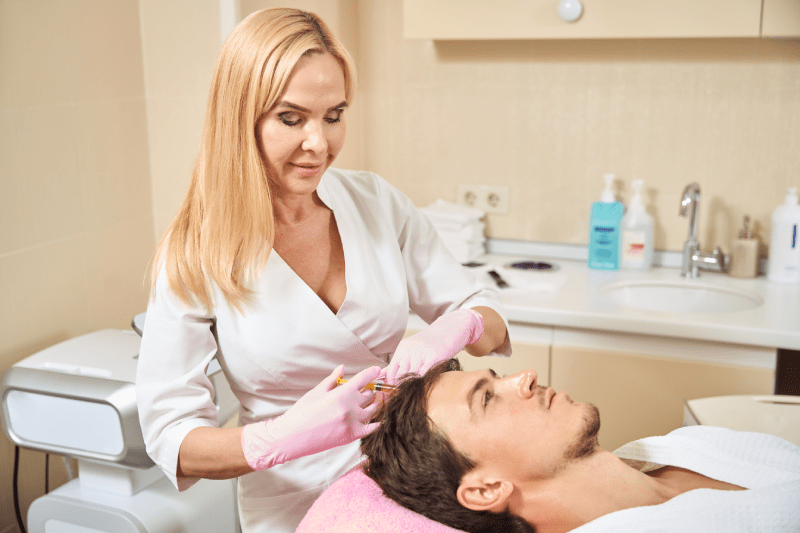
Limited Technology Options in Hair Transplantation
Some clinics in Paris may still focus on more traditional FUE methods. The latest, high-density transplant techniques like Sapphire FUE or DHI may not be standard in every clinic. Turkey, due to global competition and demand, is one of the countries that has most rapidly adapted and most widely uses these technologies. Cure Holiday is committed to offering its patients the latest technological techniques.
General Disadvantages of Getting a Hair Transplant in Paris
In summary, the disadvantages of getting a hair transplant in Paris are high cost, logistical complexity, potential long waiting times, and the lack of package services. Although the quality is high, the cost difference for the service provided makes Turkey a much more logical and accessible option. Hair transplantation should be a treatment, not a luxury consumption item.
Why is Turkey the Global Hub for Hair Transplantation?
Turkey, especially Istanbul, has become a global giant in the field of hair transplantation over the last decade. The main reasons include government incentives, unique surgical experience gained from a high volume of cases, international-standard clinic infrastructure, and most importantly, the ability to offer quality at Western standards but at much more affordable prices. This experience has enabled Turkish teams to work with the world’s most complex and challenging cases.
Turkey Hair Transplant Price Comparison: Unrivaled Advantage
Hair transplant prices in Turkey are 70% to 85% lower compared to Paris. This price difference stems not only from lower operating costs but also from intense competition. Patients can receive the entirety of the service in Turkey, including luxury packages that cover everything except the airfare, for much less than the cost of the operation alone in Paris. This economic advantage is possible without compromising on quality.
Turkey with Cure Holiday: Where Quality and Economy Meet
Cure Holiday serves as a reliable bridge for international patients seeking hair transplantation in Turkey. The company collaborates only with the best hospitals in Turkey, which have JCI accreditation, and the most experienced surgeons. Cure Holiday offers patients both an economical and a first-class experience, creating a realistic and high-quality alternative to the high-priced allure of Paris.
Quality Standards and Accreditations in Turkey
Leading hair transplant centers in Turkey have adopted clinical standards equal to or superior to those in Europe and America. Many clinics are accredited by the Joint Commission International (JCI). These accreditations provide the highest level of assurance regarding hygiene, patient safety, and treatment quality. The medical infrastructure and technological equipment of the hospitals are continuously updated.
Cure Holiday Packages: All-Inclusive Comfort
Cure Holiday offers all-inclusive packages that eliminate all worries for international patients. These packages typically include:
- Hair transplant operation in a hospital equipped with the latest technology.
- 2-3 nights stay in a 5-star hotel.
- Airport and clinic/hotel transfers (with VIP vehicles).
- All necessary medications, shampoos, and post-operative care kits.
- Interpretation services in the patient’s native language and 24/7 personal coordinator support.
Expertise in Special DHI and Sapphire FUE Techniques
The clinics collaborating with Cure Holiday specialize in high-precision techniques such as Sapphire FUE and DHI. These techniques provide denser, more natural, and less traumatic results. Turkey is the place where these advanced techniques are most frequently applied and where the most experience has been gained. Compared to Paris, access to these techniques is much easier and more common in Turkey.
Experienced Expert Staff and High Volume of Cases
A high volume of cases directly translates to experience. Hair transplant teams in Turkey are constantly working to meet international demand. This has allowed both surgeons and technicians to encounter every type of baldness pattern and difficulty. This deep experience makes a critical difference in the ability to manage unexpected situations during the operation.
Comprehensive Support During the Recovery Process
The support provided during the recovery process is one of Cure Holiday’s strongest points. Patients are supported by the clinic during critical stages like the first wash and their progress is monitored with monthly remote follow-up sessions even after returning home. This comprehensive and uninterrupted support makes the recovery period much safer and stress-free.
Language Support and International Patient Experience
Cure Holiday uses a multilingual team to ensure patients feel comfortable. Patient coordinators accompany the patient from the consultation process to the operation day and through recovery follow-up. This personal attention and language support completely eliminate the anxiety of receiving treatment in a foreign country.
Istanbul’s Location: Treatment and Holiday Opportunity
Istanbul is one of the world’s most fascinating cities, famous for its historical and cultural richness. Hair transplant treatment typically requires a 2-3 day process. While receiving treatment with Cure Holiday, patients also have the opportunity to explore the beauties of Istanbul (considering the rest period after treatment) and take a low-cost holiday. This offers a pleasant experience, unlike the logistical stress focused solely on treatment in Paris.
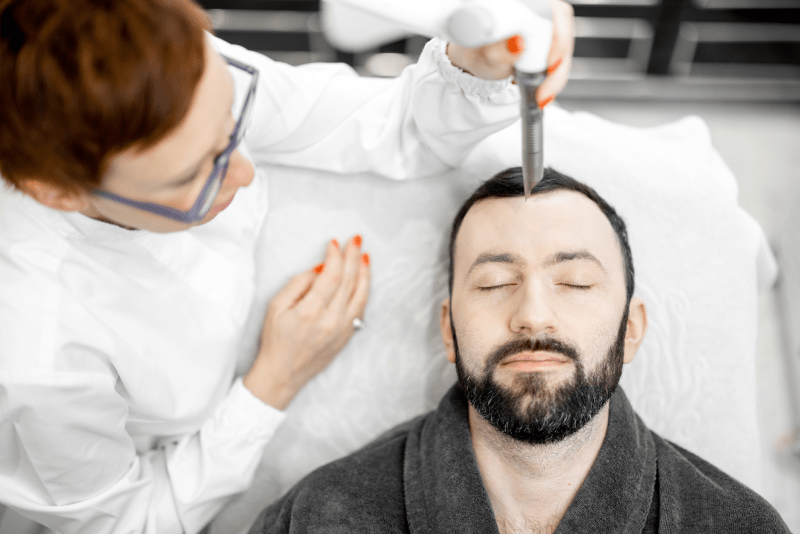
The Economic Difference of Treatment in Turkey Compared to Paris
The economic difference is seen not only in the cost of the operation but also in the total travel budget. An all-inclusive package in Turkey costs much less than what you would pay for the surgery alone in Paris. This allows the patient to use the saved money either for a holiday or for additional treatments such as vitamins or PRP after the surgery. Financially, Turkey is clearly ahead.
Post-Hair Transplant Process and Ease of Follow-up
Cure Holiday manages the follow-up process, which lasts up to 1 year after the operation, with seriousness. Patient photos are regularly evaluated, and instant solutions are offered for any issues. This long-term commitment ensures patients are confident in their results and offers a significant guarantee compared to the limited follow-up in Paris.
Regain Your Hair in Turkey with Cure Holiday
When deciding on a hair transplant, not only the cost but also the surgical experience, the technology used, and the scope of the support package offered are important. Cure Holiday brings all these factors together at the highest standard and the most favorable price, offering the most logical and reliable solution against the luxurious but expensive options in Paris. Trust a brand that thousands of international patients have relied on, and turn your dream of regaining your hair into reality.
Paris or Turkey? The Answer is Very Clear
If you do not want to spend a large part of your budget just on location, but instead want the best value for your money with the best experience, technology, and all-inclusive comfort package, the answer is undoubtedly Turkey. The case experience of the specialized teams in Turkey and the flawless organization provided by Cure Holiday surpass every advantage a Parisian clinic can offer.
Contact Cure Holiday Today for Free Consultation
Before embarking on this life-changing journey, we strongly recommend that you get a free and personalized consultation from the expert team at Cure Holiday. Get your hair analysis done, and learn your personalized treatment plan and all-inclusive package price. We are only a phone call or email away. Take action now and reclaim your self-confidence.
